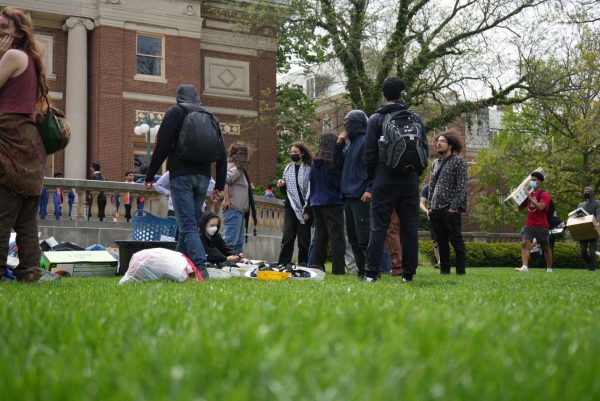Politics, sex collide with disastrous future
September 16, 2004
Margaret Atwood’s “The Handmaid’s Tale” captures the emotion of that dream where you are standing naked in front of your physics lecture. The story is freaky and horrifying, but no one can wake up out of this nightmare. The United States of America has become the Republic of Gilead – run by a totalitarian, religious government, which divides the population into groups with different reproductive capabilities given that birth rates have fallen dramatically.
Originally published in 1986, “The Handmaid’s Tale” is timely in its warnings against “Big Brother” government. And regardless of your political views, there’s still a good reason to read it. Since this is an older book you can actually check it out from a campus library!
The narrator Offred (“of Fred”, the man she is a handmaid for) keeps a diary covering the classic topics. She writes about her job (bearing children for the head of the house), her love life (interacting with men only at a monthly ceremony when the head of the house attempts to impregnate her as his wife prays for Offred’s womb), her family (nonexistent after her daughter is given to more “suitable” parents in the Republic), and current beauty remedies (denied anything that does not directly impact her ability to give birth, Offred uses butter as a moisturizer). The Republic of Gilead strips her of the right to earn money, the right to literacy and the right to speak freely.
This is a great book to explain modern feminism; when there is not equality between the sexes everyone suffers, not just the women. In “The Handmaid’s Tale,” the law bars men and women from any voluntary relationships, whether romantic or platonic, and ultimately strips away any ability to choose. This is one of the most disturbing and uncomfortable books I have ever read, but the language is beautiful.
“I wait for the day to unroll, for the earth to turn, according to the round face of the implacable clock. The geometrical days, which go around and around, smoothly and oiled. Sweat already on my upper lip, I wait, for the arrival of the inevitable egg, which will be lukewarm like the room and will have a green film on the yolk and will taste faintly of sulphur.”
Get The Daily Illini in your inbox!
Atwood weaves a story out of very ordinary events in a less than ordinary world and carefully integrates the world’s every minute detail. Offred, as narrator, is self-aware to a fault; she knows she is not telling a story of heroics and courage.
“I wish this story were different. I wish it were more civilized. I wish it showed me in a better light, if not happier, then at least more active, less hesitant, less distracted by trivia.”
“The Handmaid’s Tale” is much less about the Republic of Gilead as it is about our everyday lives when sex and politics intersect. If you’re looking for a heavier read, “The Handmaid’s Tale” definitely allows you to ponder. It is almost clich‚ to believe that you or I will always represent and die for our beliefs if necessary. But if everything that you hold dear is slowly torn away and you start to feel less than human, can you fight or do you melt away?
“Is that how we lived, then? But we lived as usual. Everyone does, most of the time. Whatever is going on is as usual. Even this is as usual, now.
We lived, as usual, by ignoring. Ignoring isn’t the same as ignorance; you have to work at it.
Nothing changed instantaneously: in a gradually heating bathtub you’d be boiled to death before you knew it.”
So, “The Handmaid’s Tale” provides a timeless social commentary that makes it worth a read 18 years later.






